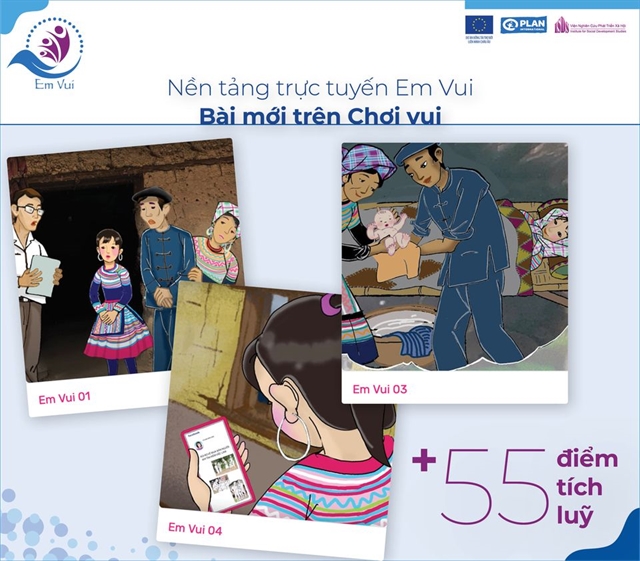 Society
Society

Efforts have been made to promote digital platforms in supporting children and young people from ethnic groups in dealing with the risks of child marriage and human trafficking

|
| The digital platform Em vui is designed to be a friendly, reliable and informative space where ethnic minority children and young people can learn online safety skills and access support services relating to child marriage and human trafficking. — Photo Courtesy of EMPoWR project |
HÀ NỘI — Efforts have been made to promote digital platforms in supporting children and young people from ethnic groups in dealing with the risks of child marriage and human trafficking.
A survey under the project "Reducing child marriage and consanguineous marriage in ethnic minority areas in the period 2015-2025" conducted by the Committee for Ethnic Minority Affairs in 2019 showed that the child marriage rate of 53 ethnic groups in Việt Nam decreased from 26.6 per cent in 2014 to 21.9 per cent in 2019. The Mong ethnic group has the highest rate of child marriage, with 51.5 per cent of its population getting marriage before regulated ages.
Joining to tackle the issue, the Institute for Social Development Studies (ISDS), Plan International in Việt Nam, the Department of Children under the Ministry of Labour, Invalids and Social Affairs, and other agencies have been implementing a project “Enhancing awareness of ethnic minority children and young people on human trafficking and child marriage through digital technology” (EMPoWR).
The project was co-funded by the Delegation of the European Union and Plan International in Belgium.
The project was rolled out in 52 communes across four provinces - Hà Giang, Lai Châu, Quảng Bình and Quảng Tri - between 2020 to 2023, supporting young people aged 10 to 24 through digital platforms.
Under the project, the digital platform Em vui, which translates as "I'm happy", can be accessed via emvui.vn, smartphone app and is also available on popular social media platforms such as Facebook, Tiktok, Zalo, Youtube, Instagram and Twitter.
The forum is designed to be a friendly, reliable and informative space where ethnic minority children and young people can learn online safety skills and access support services relating to child marriage and human trafficking.
It is also a platform for them to voice their concerns to policymakers, creating feedback that will allow more suitable and effective policies to be put in place.
Between July 2020 and April 30, 2022, the online platform Em Vui has launched more than 40 videos and documents on knowledge related to online safety, reproductive health, prevention of child marriage and human trafficking. It has 1,342 registered members, 28,000 hits and more than 32,000 interactions, comments, lessons and downloads.
In addition, six social media channels of Em Vui have published nearly 165 articles, attracting much attention from social network participants across the country.
Phan Thanh Ngọc, project coordinator of Plan International Việt Nam, said that the survey of 1,725 ethnic children under the EMPoWR Project in 2020 in 17 communes in four provinces, Hà Giang, Lai Châu and Quảng Bình and Quảng Tri, showed that child marriage was decreasing.
However, only 28 per cent of children are equipped with knowledge about child marriage, according to the survey. Only 52 per cent of the surveyed children have a correct understanding of the minimum age for marriage.
They often misunderstand the age at which men can get married, and at the same time, girls also feel more pressure to get married as they are worried no one will marry them.
72 per cent know at least two consequences of child marriage, most commonly affecting their future career, study and personal health. Only 60 per cent are willing to oppose forced marriages. This rate is higher among girls and schoolchildren.
Similarly, only 3 per cent of children can recognise the risk of being trafficked. Only 11 per cent know how to avoid risks. About 37 per cent of the children learn at least two emergency numbers, namely 111 (Child Protection Hotline) and police 113.
It is worth noting that 91 per cent of surveyed children and young people of ethnic minorities use the internet, mainly with smartphones, and usually use it for one to three hours per day. However, only 10 per cent of them said that they know about online safety.
Notably, more than 60 per cent of them said that they are willing to accept dating, even online dating.
The head of ISDS and director of the EMPoWR project, Khuất Thu Hồng, said that the digital resources that the project provided were useful not only for children and young people from ethnic groups but also for individuals, agencies, and organisations when it came to child marriage and human trafficking.
She said that she expected organisations and media to join in promoting the useful information and create messages to improve public awareness.
H.T.N, a girl from the Vân Kiều Ethnic group in the central province of Quảng Bình, said that she and her friend used the app Em vui for more than two months.
“I can find comic books that help us easily learn about child marriage and human trafficking prevention and control,” she said. — VNS




